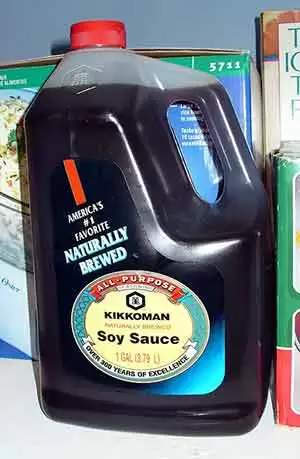Celiac.com 09/19/2024 - Imitation crab, also known as surimi, is a popular seafood alternative made from processed fish paste. While it is often chosen for its affordability and versatility, it can pose challenges for individuals with celiac disease or gluten sensitivity. The gluten content in imitation crab arises from certain additives and processing methods, making it crucial for consumers with dietary restrictions to be vigilant about their food choices.
Ingredients in Imitation Crab
The primary ingredient in imitation crab is surimi, a paste made from finely minced fish, typically pollock. This paste is mixed with various other ingredients to create a product that resembles and tastes like real crab. These additional ingredients often include flavorings, colorings, and stabilizers. Among these additives, wheat-based starches and binders are commonly used to improve the texture and shelf-life of the product.
Celiac.com Sponsor (A12):
Wheat starch is a particularly common ingredient in imitation crab, serving as a binder to hold the fish paste together. This starch, however, contains gluten, making the product unsuitable for those with celiac disease or gluten intolerance. Additionally, the flavorings and colorings used in imitation crab can sometimes be derived from gluten-containing sources, further complicating the matter for those trying to avoid gluten.
Cross-Contamination Risks
Even if an imitation crab product does not explicitly list gluten or wheat as an ingredient, there remains a risk of cross-contamination during production. Many food manufacturing facilities process a variety of products, including those that contain gluten. This means that gluten particles can inadvertently contaminate gluten-free items, making them unsafe for individuals with celiac disease. Cross-contamination can occur at various stages of production, including during the mixing, packaging, and storage processes.
For those with severe gluten sensitivity or celiac disease, even trace amounts of gluten can trigger adverse reactions. This is why it is crucial for manufacturers to implement stringent cross-contamination prevention measures and for consumers to be aware of the potential risks associated with processed foods like imitation crab.
Identifying Gluten-Free Imitation Crab
While the majority of imitation crab products on the market contain gluten, there are some gluten-free alternatives available. These products are specifically formulated without gluten-containing ingredients and are processed in facilities that minimize the risk of cross-contamination. To ensure that a product is safe, consumers should look for packaging that clearly states "gluten-free" or carries a certification from a recognized gluten-free certification body.
In addition to checking for gluten-free labels, it is advisable for consumers to thoroughly read the ingredient list on imitation crab packaging. Ingredients such as wheat starch, modified food starch, and unspecified "natural flavors" can be indicators of gluten content. When in doubt, contacting the manufacturer directly can provide clarity on whether a particular product is safe for consumption by those with celiac disease or gluten sensitivity.
The Importance of Vigilance for Celiac Disease Patients
For individuals with celiac disease, maintaining a strict gluten-free diet is essential to managing their condition and avoiding serious health complications. Gluten consumption can lead to a range of symptoms, including digestive distress, nutrient malabsorption, and long-term damage to the small intestine. Therefore, understanding which foods are safe and which pose a risk is a critical aspect of disease management.
Imitation crab is a common ingredient in many dishes, from sushi rolls to seafood salads. However, its potential to contain gluten means that individuals with celiac disease must exercise caution when consuming these foods. Being informed about the ingredients and production processes of imitation crab can help prevent accidental gluten ingestion and ensure that dietary needs are met.
Brands of Gluten-Free or Naturally Gluten-Free Imitation Crab
Several brands of imitation crab offer gluten-free options, but it's essential to check labels or contact manufacturers directly to ensure that the specific product is safe for those with celiac disease or gluten sensitivity. Here are some brands known for offering gluten-free imitation crab:
- Trans-Ocean Products: Their "Simply Surimi" brand is often labeled gluten-free and made with natural ingredients, with no added starches or fillers.
- Louis Kemp: Some products under this brand are labeled gluten-free, including their Crab Delights, which are made with surimi.
- Crab Classic: This brand offers gluten-free surimi seafood options, with clear labeling to help consumers make safe choices.
- Trident Seafoods: They produce some gluten-free surimi products, such as the "Gluten-Free Fish Sticks," but you should verify each product specifically.
When shopping, always look for a gluten-free label or certification on the packaging. If unsure, contacting the manufacturer for the most current information is the best approach.
Conclusion: Why This Matters for Celiac Disease
The discussion of gluten content in imitation crab highlights a broader issue faced by those with celiac disease: the hidden sources of gluten in processed foods. Imitation crab, though seemingly innocuous, can be a source of gluten due to the use of wheat-based additives and the risk of cross-contamination during production. This makes it essential for individuals with celiac disease to be diligent in their food choices, always checking labels and seeking out certified gluten-free products.
For those with celiac disease, the consequences of gluten exposure can be significant, making it vital to avoid all potential sources of gluten. By understanding the ingredients in imitation crab and being aware of the risks, individuals with celiac disease can better navigate their dietary restrictions and maintain their health. The availability of gluten-free alternatives provides a safer option, but the responsibility remains with the consumer to stay informed and cautious.
This knowledge empowers those with celiac disease to make informed decisions, ultimately contributing to better health outcomes and a higher quality of life.











Recommended Comments
There are no comments to display.
Create an account or sign in to comment
You need to be a member in order to leave a comment
Create an account
Sign up for a new account in our community. It's easy!
Register a new accountSign in
Already have an account? Sign in here.
Sign In Now